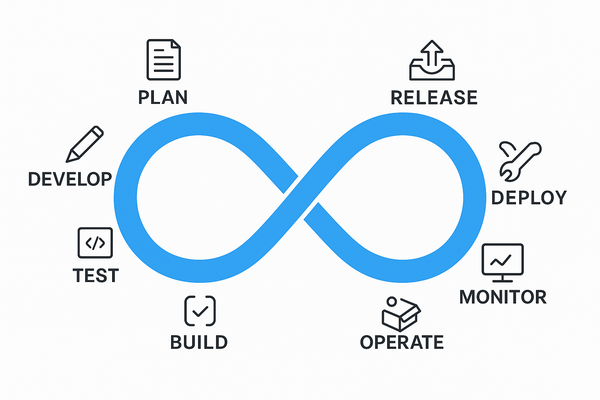In 2025, DevOps AI is undergoing a significant transformation, propelled by advancements in artificial intelligence (AI) and automation. While complete automation of DevOps remains a complex goal, the integration of AI is revolutionizing various aspects of the DevOps lifecycle, enhancing efficiency, reliability, and scalability.
The Evolution of AI in DevOps
AI’s role in DevOps has expanded from automating repetitive tasks to enabling intelligent decision-making and predictive analytics. This evolution is evident in several key areas:
- Predictive Analytics for Incident Management: AI analyzes historical data and system logs to predict potential failures, allowing teams to proactively address issues before they escalate. Medium+3Copilot4DevOps+3DevOps.com+3
- AI-Enhanced Testing and Quality Assurance: Machine learning algorithms automatically generate test cases based on code changes, reducing manual effort and accelerating the CI/CD pipeline. DevOps.com+1Toxigon+1
- Intelligent Incident Management: AI identifies patterns in incidents and recommends fixes, streamlining troubleshooting and reducing downtime. Copilot4DevOps
- Natural Language Processing for Collaboration: AI-powered tools enable teams to interact with DevOps systems using plain language, improving collaboration and efficiency. Copilot4DevOps
- Self-Healing Systems: AI detects anomalies and automatically resolves issues without human intervention, enhancing system reliability. DevOps.com
Emerging Trends Shaping DevOps Automation
Several trends are influencing the trajectory of DevOps automation:
- Serverless and Cloud-Native Architectures: The adoption of serverless computing and cloud-native tools like Kubernetes and Docker allows for more scalable and resilient applications. DevOps.com
- Implementation of MLOps: As organizations increasingly adopt AI and machine learning, establishing a well-defined MLOps framework becomes essential for managing data quality, model retraining, and infrastructure. ventiqo.com
- Emphasis on NoOps: The NoOps approach focuses on reducing operational requirements through automation, enabling the creation of self-healing systems and clear alert mechanisms. ventiqo.com+1SquareOps+1
- Application of GitOps: GitOps extends DevSecOps practices to infrastructure automation, offering enhanced efficiency, security, and faster deployments by unifying infrastructure and application development lifecycles. DevOps -+4ventiqo.com+4SquareOps+4
Challenges and Considerations
Despite the advancements, several challenges hinder the full automation of DevOps:
- Skills Shortages: A significant number of IT teams face skills shortages, impacting the implementation and maintenance of automation tools. IT Pro
- Underinvestment: Insufficient investment in automation capabilities slows down development and deployment processes, leading to delays and increased costs. IT Pro
- Integration with Legacy Systems: Integrating AI and automation tools with existing legacy systems poses technical challenges and requires careful planning.
- Security and Compliance: Ensuring that automated systems adhere to security standards and regulatory compliance is critical, necessitating robust governance frameworks.
The Road Ahead: Strategic Adoption of AI in DevOps
To harness the benefits of AI-driven DevOps automation, organizations should consider the following strategies:
- Modular Implementation: Adopt a modular approach by automating well-defined tasks first, gradually expanding to more complex processes.Financial Times
- Investment in AI-Native Infrastructure: Building infrastructure designed for AI integration can maximize the benefits of automation and improve scalability.
- Focus on Governance and Transparency: Establish clear governance policies to manage AI systems, ensuring transparency, accountability, and alignment with business objectives.Financial Times
- Continuous Learning and Optimization: Regularly train and optimize AI agents to adapt to changing environments and improve performance over time.Financial Times
Conclusion
While the complete automation of DevOps is an ongoing journey, the integration of AI is undeniably transforming the landscape. By strategically adopting AI-driven tools and practices, organizations can enhance efficiency, reduce downtime, and accelerate innovation. As we move forward, the synergy between human expertise and AI capabilities will define the next era of DevOps
Next Steps
- Follow our DevOps tutorials
- Explore more DevOps engineer career guides
- Subscribe to InsightClouds for weekly updates
- Subscribe our DevOps youtube channel

Leave a Reply